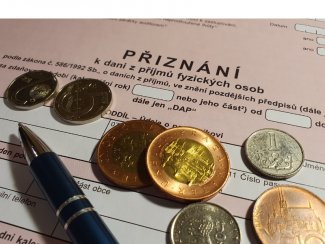The Czech fiscal reform: a major income tax cut

On 20 November, the Chamber of Deputies adopted a package of tax changes, which – if finally approved – will result in the largest fiscal reform in the Czech Republic since at least 2008. In effect, a 15% income tax rate will be imposed only on gross salary, and not – as has been the case since 2008 – on gross salary plus the amount of contributions paid by the employer (the so-called superhrubá mzda). Thus, the effective tax rate for people with lower and medium incomes will drop from 20.1% to 15%. At the same time, the effective tax rate for the second tax bracket, i.e. for those with the highest incomes (over CZK 140,000, or EUR 5,330), will decrease from 27.1% to 23%. Their situation will also improve since the amount of earnings qualifying for the higher tax bracket will slightly increase. The adopted package also includes a significant increase in the tax-free amount (by approx. 37%), which will mean the annual income tax paid will be reduced by the equivalent of one national average monthly salary (currently approx. EUR 1,300). This proposal was put forward by the opposition Pirate Party and was backed by the political left. The Ministry of Finance is opposed to this and has announced it will try to convince the Senate to change this part of the regulations. The package also envisages a cut in the excise duty on diesel oil and imposing a higher excise duty on tobacco products. The main part of the changes, including a new method of calculating income tax, is expected to apply from January 2021.
The tax package gained a majority in the Chamber of Deputies due to the votes of deputies from ANO (the party led by Prime Minister Andrej Babiš), the opposition right-wing Civic Democratic Party (ODS), the Freedom and Direct Democracy (SPD, an anti-EU grouping which occasionally co-operates with the government), and several deputies from the Communist Party. The Czech Social Democratic Party (ČSSD, a member of the government coalition) refused to back the reform.
Commentary
- The reform is a response to business circles’ demands to reduce and simplify labour taxation. As a result of these changes, the net earnings of an average citizen will increase by 6.25%. This will improve the fiscal competitiveness of the Czech Republic as compared to the countries in the region. Workers’ higher incomes may also somewhat ease the wage pressure on companies whose costs have risen in recent years due to the fact that the Czech Republic has the lowest unemployment rate in the EU and limited inflow of foreign labour. Over the past decade, the average monthly salary in the national economy has increased in the Czech Republic by as much as 51% (compared to 27% in Slovakia, 34% in Poland and 26.5% in Germany). In the second quarter of this year, it was around EUR 1,300, i.e. nominally three times lower than in Germany, but also 16% higher than in Poland and 27% higher than in Slovakia.
- The reform will end the illusion that a flat tax functions in the Czech Republic, and will significantly simplify the tax system. So far, a flat tax did formally apply in this country but, since some exceptions existed, tax brackets were used in practice. The complexity of the Czech system resulted from the reluctance to sacrifice the priority of keeping low public debt in order to introduce a full flat tax. Therefore, an unusual method of calculating an overstated gross amount was introduced already at the stage of the attempt to move from the classic progressive taxation (12–32%) to a flat tax system (15%) in 2008, and then the higher tax bracket was introduced in 2013 with the imposition of a solidarity tax.
- No major problems are expected in the further legislative process for most of the changes, even if they are opposed by the Senate, where the opposition predominates. On the other hand, the amendment which significantly increases the tax-free amount is likely to be withdrawn. The Ministry of Finance considers this to be “irresponsible and ruining the budget”. The group of political parties that passed the package of laws also has a majority necessary to override President Miloš Zeman’s possible veto. Zeman prefers higher taxation and wants the amended system to apply for only two years. This time limit was mentioned in the explanatory memorandum for the amendments, probably with the intention of calming the president down. However, this limitation is not envisaged in the main text of the draft amendment, so it will not be binding. The Prime Minister has emphasised that he treats this stipulation as his “public political commitment”. In practice, however, a legislative initiative will be needed to amend the regulations. Given the fact that tax rises are always unpopular, this will be difficult to implement.
- The possible impact of the reform on the economy is controversial in the Czech Republic. It is also discussed whether the state should ease the burden on the top earners, who also benefit from the reduction of labour taxation. Some Czech economists point out that such people have a stronger tendency to save money, and buy imported products more often. As a result, the demand stimulus for the domestic economy will not be as strong as expected, and will consequently not be able to eliminate the negative effects of a reduction in budget revenues in the long run. On the other hand, supporters of the tax reform argue that the Czech public is one of the most egalitarian in the world (e.g. according to Eurostat – which measures the ratio of the total income of 20% of the richest and poorest inhabitants of individual EU countries – the Czech Republic is the most egalitarian in this group of countries), and relatively small income disparities do not motivate people enough to raise their qualifications or make investments. In such conditions, additional effort (e.g. getting a better education) and risk (e.g. linked to investment projects) will not bring a satisfactory reward (in the language of economy: the education, risk and diligence premiums are low). Therefore, the adopted tax changes could trigger the improvement of qualifications and increasing investment, which may ultimately lead to changing the widely criticised model of the Czech economy as a large ‘assembly plant’, where production with low added value predominates.
- There is a strong concern in the Czech Republic that the budget deficit will significantly grow as a result of the reform. The amendments will increase the gap by CZK 130 billion (almost EUR 5 billion), which means that the planned deficit in 2021 – which is already record-high – will be increased by 41% (by 31% if the new tax-free amount is not introduced). Thus, the deficit-to-GDP ratio will be significantly higher than in 2019 – it will increase from 0.5% to 8–10%. Consequently, the policy of constant public debt reduction may be seriously challenged due to the reform. The current level of public debt is 30% of GDP and, in the worst-case scenario presented by the Czech Fiscal Council, it may increase to 55% of GDP in 2025. Nevertheless, even if it grows that much, Czech debt will probably still be among the lowest in the EU. Prime Minister Babiš has advocated the idea of fiscal responsibility for a long time. However, less than a year before the parliamentary elections, he focused on moves aimed at increasing the direct revenues of Czechs, thus trying to convince potential voters and provide impetus for a weakened economy (GDP is expected to fall this year by approx. 7% y/y). Maintaining a balanced budget is also an important point in the political manifesto of the right-wing opposition party ODS. However, reducing the burden on entrepreneurs is equally important for this party; hence its support for the reform. Since the ČSSD, a member of the government coalition, refused to back the reform, the support from ODS was decisive for passing the amendments.
- The adoption of the tax package has caused tensions inside the minority coalition formed by ANO and the Czech Social Democratic Party (ČSSD), but there is little risk that the coalition will break up. Although the Social Democrats were not opposed to simplifying the tax system (this is part of the government’s agenda), they suggested that the lower rate should be set at 19% due to the need to balance the budget during the economic crisis. When the package was passed, the faction inside the ČSSD that had been opposed to the coalition with ANO became animated again. Several leading local government politicians who are members of this faction called for leaving the coalition. They pointed to the dramatic fall of revenues for local governments as a result of the reform – by as much as a quarter. However, it is unlikely that the ČSSD would be able to convince voters that the tax reform increasing their revenues is a sufficient reason to break up the coalition; it is also doubtful whether this would pay off with still a year before the election. Moreover, Babiš has already pointed out that, if the coalition collapsed, he would nominate ‘experts’ from ANO in place of the ministers who would have left the coalition. A government like this could rule the country until the next election – a vote of no confidence would be unlikely as Babiš, who co-operates well with President Zeman, could count on support from SPD and the communists.
- The fact that ANO and ODS have voted together will make it difficult for an opposition bloc to be formed against Babiš before the election next year. This has also highlighted the long-lasting problems of the divided and fragmented Czech opposition, which make it easier for ANO to maintain its primacy on the Czech political scene. ODS’s support for the reform has been severely criticised by the centre-right parties KDU-ČSL and TOP 09, with whom ODS had previously signed a memorandum of cooperation. To ease the tension, ODS gave assurances that it would not give up its demands to maintain a balanced public budget in the long term, and therefore also proposes a cut in expenditure (e.g. by liquidating some offices). In the event that the parties of the current opposition do not gain a majority after the election, a staff reshuffle within ODS cannot be ruled out. This would pave the way for it to form a coalition with ANO.





